
Corsican is a Romance language consisting of the continuum of the Italo-Dalmatian dialects spoken on the Mediterranean island of Corsica (France) and on the northern end of the island of Sardinia (Italy). Corsican is related to the varieities of Tuscan from the Italian peninsula, and therefore also to the Florentine-based standard Italian.
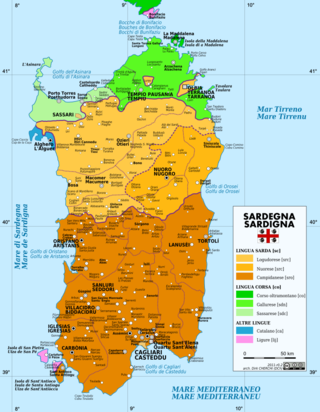
Gallurese is a Romance dialect of the Italo-Dalmatian family spoken in the region of Gallura, northeastern Sardinia. Gallurese is variously described as a distinct southern dialect of Corsican or transitional language of the dialect continuum between Corsican and Sardinian. "Gallurese International Day" takes place each year in Palau (Sardinia) with the participation of orators from other areas, including Corsica.
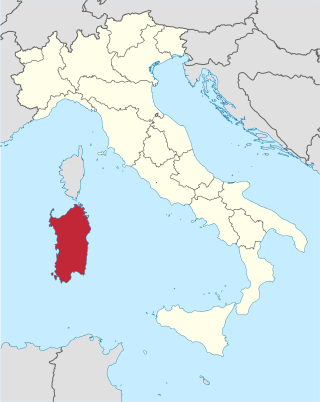
Sardinia is the second-largest island in the Mediterranean Sea, after Sicily, and one of the 20 regions of Italy. It is located west of the Italian Peninsula, north of Tunisia and immediately south of the French island of Corsica.

The Strait of Bonifacio is the strait between Corsica and Sardinia, named after the Corsican town Bonifacio. It is 11 km (6.8 mi) wide and divides the Tyrrhenian Sea from the western Mediterranean Sea. The strait is notorious among sailors for its weather, currents, shoals, and other obstacles. The strait, while relatively narrow, has no fixed link and relies on ferry services.

Santa Teresa Gallura is a town on the northern tip of Sardinia, on the Strait of Bonifacio, in the province of Sassari, Italy. The southern coast of French island Corsica can be seen from the beach. The city is one of several possible locations for the ancient city of Tibula.

The Province of Sardinia and Corsica was an ancient Roman province including the islands of Sardinia and Corsica.

The Corsicans are a Romance Italic ethnic group. They are native to Corsica, a Mediterranean island and a territorial collectivity of France.
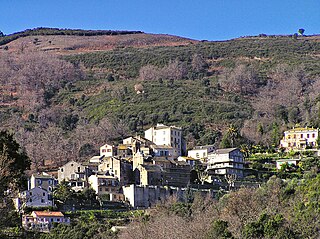
Lucciana is a French commune in the department of Upper Corsica, collectivity and island of Corsica.

Corsica is an island in the Mediterranean Sea and one of the 18 regions of France. It is the fourth-largest island in the Mediterranean and lies southeast of the French mainland, west of the Italian Peninsula and immediately north of the Italian island of Sardinia, the nearest land mass. A single chain of mountains makes up two-thirds of the island. As of January 2023, it had a population of 351,255.
The Corsica national football team is the unofficial football team for the island of Corsica, France. It is not affiliated with FIFA or UEFA. The selection has played against national teams thirteen times.

Corsica Ferries - Sardinia Ferries is a Franco-Italian ferry company that operates traffic to and from the islands of Corsica, Sardinia and Elba.
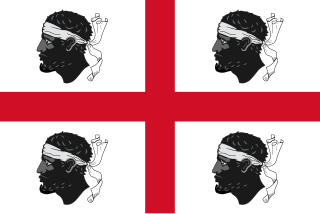
The Kingdom of Sardinia, also referred to as the Kingdom ofSardinia-Piedmont or Piedmont-Sardinia as a composite state during the Savoyard period, was a country in Southern Europe from the late 13th until the mid 19th century.
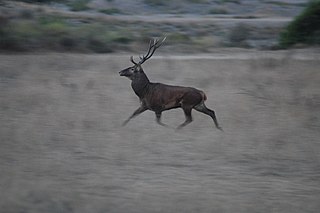
The Corsican red deer, also known simply as the Corsican deer or Sardinian deer, is a subspecies of red deer found on the Mediterranean islands of Sardinia (Italy) and Corsica (France).
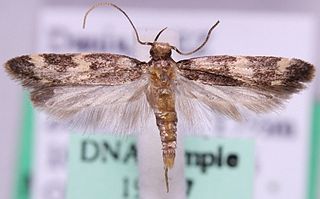
Oegoconia novimundi is a moth of the family Autostichidae. It is found in Spain, France, Germany, Austria, Slovakia, Belgium, Croatia, former Serbia and Montenegro, Italy, Bulgaria, Hungary, North Macedonia, Greece and on Corsica and the Azores.
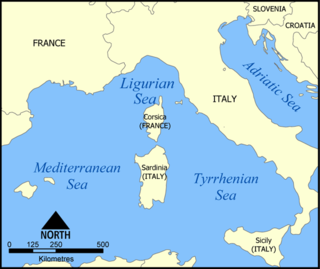
The Italian occupation of Corsica refers to the military occupation by the Kingdom of Italy of the French island of Corsica during the Second World War, from November 1942 to September 1943. After an initial period of increased control over the island, by early spring 1943 the Maquis had begun to occupy the hinterland. In the aftermath of the Armistice of Cassibile, the Italian capitulation to the Allies, some Italian units sided with German troops sent to replace the Italian garrison and some defected to the Maquis and Free French Forces.
Oegoconia annae is a moth of the family Autostichidae. It is found on Sardinia.
Oegoconia ceres is a moth of the family Autostichidae. It is found on Sardinia.
Bariadorgia is a white Italian/French wine grape variety that likely originated on the island of Sardinia but today is only found in limited planting on Corsica. Despite similarities in synonyms, Bariadorgia/Carcajolo blanc is not a color mutation of the red Spanish wine grape Parraleta which is also known as Carcajolo near on Sardinia.

The French expedition to Sardinia was a short military campaign fought in 1793 in the Mediterranean Sea in the first year of the War of the First Coalition, during the French Revolutionary Wars. The operation was the first offensive by the new French Republic in the Mediterranean during the conflict, and was directed at the island of Sardinia, part of the Kingdom of Sardinia. Sardinia was neutral at the time, but immediately joined the anti-French coalition. The operation was a failure, with attacks directed at Cagliari in the south and La Maddalena in the north both ending in defeat.

The Sardinia national football team is the official football team of Sardinia. It is organised by the Sardinian National Sports Federation, founded in 2012. The team has been colloquially referred with the name Sa Natzionale.















